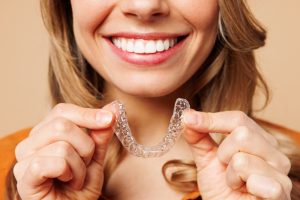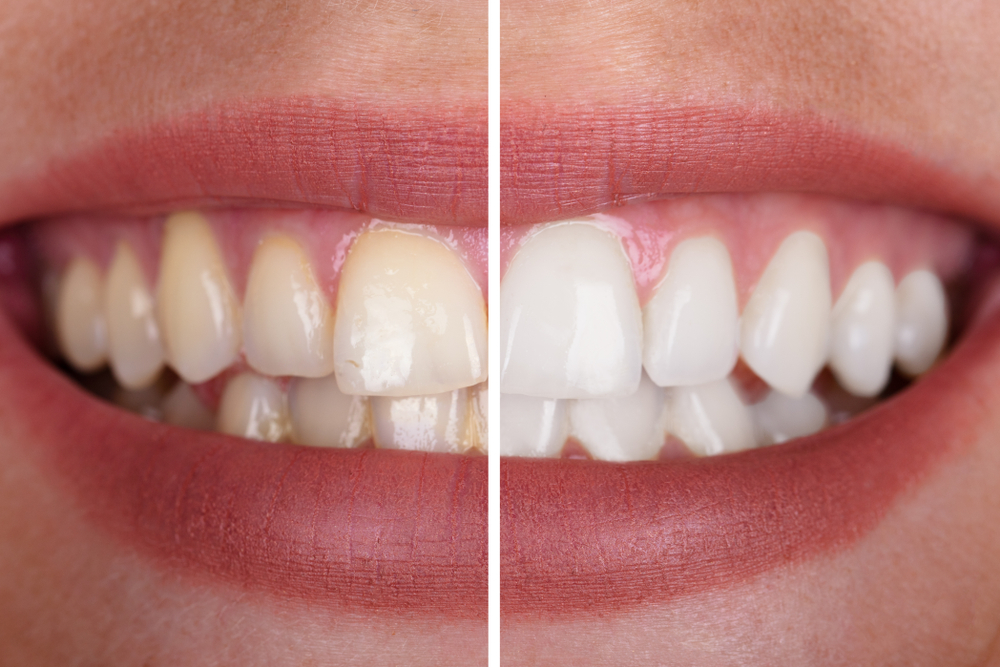The team at Parkcrest Dental Group wants you to have the best smile possible. One way to do that is through restorative dentistry, which might be an option for damaged or missing teeth. There are several treatments available, and we have doctors who have expertise in all of them.
Keep reading to learn more about how our dentists in Springfield, Missouri, can restore your smile by repairing or replacing your pearly whites.
Table of Contents
What Is Restorative Dentistry?
Restorative dentistry focuses on repairing or replacing damaged or missing teeth. The goal is to improve both the function and appearance of your smile, leading to better chewing and speaking as well as improved confidence.
Common treatments for restorative dentistry include fillings, crowns, bridges, dentures, and dental implants.
Importance of Restorative Dental Care
Sometimes, our smile might need a little extra help aside from daily brushing and professional cleanings every six months at the dentist’s office. Restorative dentistry focuses on repairing or replacing missing or damaged teeth.
The benefits of these types of treatments go beyond the return of your confident smile. Restorative dentistry techniques help people chew, speak, and enjoy their favorite foods comfortably.
A healthy smile can improve:
- Nutrition
- Oral health
- Overall health
- Self-esteem
- Social interactions with others
- Quality of life
For example, untreated cavities or broken teeth could lead to infections in the mouth that might lead to a systemic health problem that affects the whole body. Restorative dental treatments can help halt the spread of infection and protect overall health.
Missing or damaged teeth can lower self-esteem and make social interactions uncomfortable. Restoring damaged teeth can bring back your beautiful smile that others will notice.
Restorative dental care actively supports long-term dental function and stability for your entire mouth. For example, replacing missing teeth can prevent surrounding teeth from shifting, which would otherwise lead to misalignment and bite issues. Treatments like implants and bridges maintain the jaw’s structure, protecting it from bone loss and further complications.
Dental Implants
A dental implant is like getting an artificial tooth that mimics a natural tooth. These replacement teeth anchor directly into the jawbone, offering stability when chewing food. Patients with implants report a renewed confidence in their ability to eat, speak, and smile without worry, knowing their dental replacements hold firm under pressure.
Your dentist will determine if you are a good candidate for a dental implant. In general, patients must have:
- Broken teeth that are beyond repair or missing teeth
- Good overall health
- Sufficient bone density in the jaw
- An understanding of long-term dental care
- A commitment to good oral hygiene routines
Dental implants can restore your beautiful smile and can also preserve your jaw’s health. When a tooth falls out, the underlying bone begins to resorb, or shrink, because there is less blood flow due to the missing tooth. Implants stimulate the jawbone and can prevent bone loss and maintain someone’s facial structure.
Caring for a dental implant is similar to your oral hygiene routine for brushing, flossing, and rinsing natural teeth. This can make your oral care easier compared to dentures, which may require soaking overnight.
Another benefit of dental implants is that they can last for decades before needing to be replaced. They are made of durable materials that mimic what a real tooth looks and feels like.
Crowns
While implants completely replace teeth, dental crowns serve as a way to preserve what’s left of damaged or weakened teeth. A crown serves as a protective cap that restores the tooth’s shape, strength, and appearance. The goal is two-fold: prevent further decay on the tooth while restoring your bite.
The dental crown seals out bacteria and protects the tooth’s inner structure from exposure. This can reduce the likelihood of infection, pain, and more complicated treatments like a root canal. Again, one key is to take care of oral hygiene after the crown is in place and to treat it like a normal tooth.
Dental crowns are similar to implants in that they mimic natural teeth, blending seamlessly with your other teeth. Dentists customize crowns to match each patient’s tooth color, shape, and size, ensuring that the restoration complements their smile.
Crowns support long-term dental health by preserving the alignment and stability of surrounding teeth. It will help someone chew better while reducing uneven wear and decay on neighboring teeth.
Are you a good candidate for a dental crown? Your Parkcrest doctor will assess:
- The amount of decay or damage on the affected tooth
- Whether a crown can replace a large filling or if a filling won’t work
- The state of the surrounding teeth
- How much of the decayed or damaged tooth remains
Bridges
Dental bridges offer another form of treatment for missing teeth that is in between a crown and an implant. A bridge effectively fills gaps and restores both appearance and function. Unlike dentures, which are removable, bridges remain fixed in place, anchored by neighboring teeth or dental implants. Just like an implant or a crown, bridges are meant to mimic natural teeth as closely as possible.
This treatment can help you maintain proper bite alignment because surrounding teeth often drift into the empty space, leading to misalignment and bite problems. Bridges can maintain the proper spacing and alignment of teeth. You’ll have a better bite and an improved smile with a natural-looking new tooth that functions closely to the original.
A bridge also keeps the rest of your teeth healthy by distributing chewing forces evenly, reducing strain on remaining teeth and preventing uneven wear. It can help reduce jaw pain from chewing too much on other teeth.
You might be a good candidate for a dental bridge if you:
- Have a missing tooth between two healthy teeth
- Want a less-invasive option than a dental implant
- Would like a quicker solution that offers long-term results
Your Parkcrest doctor will ascertain if the two teeth next to the missing one are strong enough to anchor the dental bridge.
Dentures
Crowns, implants, and bridges are designed to replace one or two teeth. Dentures, either a partial or full set, replace multiple missing teeth to restore function to your bite. Custom-made dentures provide a comfortable and stable option for those seeking to regain their ability to chew completely, speak correctly, and smile confidently.
Patients with properly fitted dentures can eat without the limitations often associated with missing teeth, leading to better nutrition and overall health. Dentures also make speaking easier by providing structure, allowing patients to articulate sounds and words more clearly. These functional improvements contribute to greater ease, comfort, and confidence.
Dentures provide a practical and customizable solution that adapts to each patient’s specific needs. Options such as full or partial dentures offer flexibility depending on the extent of tooth loss, and modern materials create lightweight, durable, and natural-looking prosthetics.
Traditional dentures are often associated with discomfort because of the way they can shift when placed against the gums. Implant-supported dentures provide a stronger solution than traditional dentures that can improve comfort while giving more stability to the dentures themselves. Your doctor will discuss this option with you.
You might be a good candidate for dentures if you:
- Have multiple missing teeth
- Lack sufficient bone density in your jaw for dental implants
- Don’t want a more invasive procedure like implants
- Want a cost-effective option
- Need something faster than dental implants
Discuss your options with your Parkcrest doctor. We want you to have the best smile possible!
Root Canal
Your dentist might determine that a severely damaged or infected tooth can be saved, preserving its function and appearance. A root canal happens when your doctor removes the affected soft tissue that’s been damaged from the decay. Then, the tooth is completely cleaned, and the inner part is sealed to prevent further damage. Finally, a crown is placed on the restored inner part of the tooth.
The goal of a root canal is to save the root of the tooth while restoring the part of the tooth in your mouth to normal function. Natural tooth roots offer the strongest foundation for chewing as well as keeping teeth from shifting over the long term. The secondary goal of a root canal is to alleviate pain while making chewing easier.
You might be a good candidate for a root canal if you:
- Have severe tooth pain or sensitivity
- Have an infected or abscessed tooth
- Have a tooth with cracks or a lot of decay
- Want to try to preserve your natural tooth instead of having it extracted
- Do not want a dental implant or a bridge
Your Parkcrest doctor will discuss this option with you while also allaying fears that may be associated with a root canal. We’ll take care of you!
Choosing a Treatment Plan That’s Right for You
Choosing the right dental treatment plan requires a careful understanding of your specific oral health needs and personal goals. Your dentist evaluates your teeth, gums, and jaw structure to identify any underlying issues and prioritize the restorative treatments that best suit your condition. We’ll evaluate your pain and comfort level, how your mouth currently feels and functions, and look for any signs of serious issues that need to be addressed right away.
For example, dental implants work well for replacing missing teeth permanently, while bridges or dentures may provide more flexibility and affordability while being less invasive and (in general) requiring less time to complete. Understanding each option’s benefits and limitations helps you make informed choices.
We would be happy to discuss every option with you on the road to finding which one best fits your needs.
Make an Appointment at Parkcrest Dental Group
If you want to restore your smile, we’re glad to help. Please call (417) 887-1220 or fill out our contact form to make an appointment.




